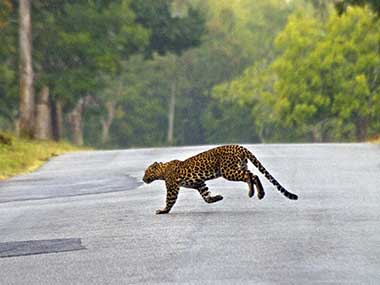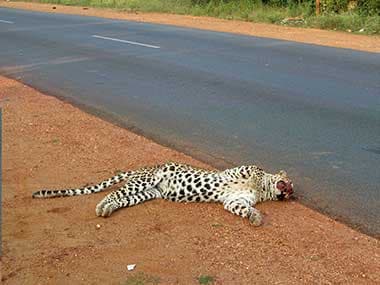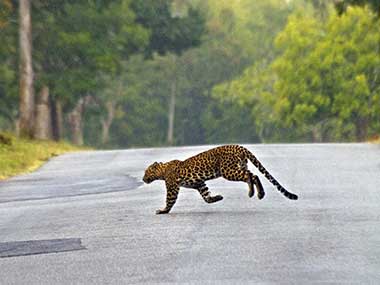Poaching, destruction of habitat and revenge killing by farmers and herdsmen are the major threats our wildlife face across the country. Now add to these another growing menace: roads and railway tracks. In the past five years, 25 leopards were mowed down by road and rail traffic in Karnataka alone. This by no means is a negligible number when compared to the number of confirmed poaching cases in the state during the same period – 41 leopard pelts have been seized in Karnataka since January 2009. Of course, the actual number of leopards poached would be higher as for every pelt seized at least another escapes the enforcement agencies. But then, not all leopards hit by vehicles or trains are reported or found either. Many limp away, severely injured, to adjacent forest patches and die a painful death afterwards. [caption id=“attachment_1646251” align=“alignleft” width=“380”]  While reptiles and amphibians are the most affected by traffic, the risk to slow-breeding large mammals are often much bigger. Image: HS Basavanna[/caption] A paper in the spring issue of IUCN’s Cat News by researchers from Mysore-based Nature Conservation Society and New York-based Panthera pointed out that massive expansion of road and railways in the last two decades not only fragmented several ecologically important areas in India but also increased the risk of direct mortalities of wildlife due to collisions with vehicles. “While small roads with low-volume traffic are being converted into busy high-speed highways, new roads are opening up remote locations. Besides, India has seen a rapid growth of motor vehicles at a compound annual rate of 10.5% during 2002-2012,” says Sanjay Gubbi, the lead author of the report. In 2012, Gubbi was among the researchers who studied the impact of vehicular traffic on the use of highway edges by large animals in Nagarhole and Bandipur tiger reserves. He observed high road mortality of chital, sambar, mouse deer, black-naped hare and small Indian civet, particularly when night traffic movement was unrestricted. Bonnet macaques and langurs are two other common victims of road accidents. Earlier, in 2010, a study from Mudumalai tiger reserve reported road mortality of 40 species, including amphibians, reptiles, birds and mammals. In 2007, another study reported 21 reptile species found as roadkill near Kaziranga national park. While reptiles and amphibians are the most affected by traffic, the risk to slow-breeding large mammals are often much bigger. The most significant finding of the recent study published in Cat News is that 19 out of 25 leopards died on road stretches that were outside sanctuaries or national parks. This underlines the presence of leopards in multiple-use and human dominated areas. Yet, few roads outside protected forests factor in the risk vehicular traffic poses to wildlife or care to undertake mitigation measures such as constructing underpasses etc. The National Wildlife Action Plan (2002-2016) prescribes regulations and mitigation measures which are rarely implemented on the ground. Road width, traffic speed and volume determine the chances of successful wildlife crossing. The risk of damage increases after sundown when wild animals are more active. But there have been few attempts to study the impact of roads on wildlife in India. “In the global context, road ecology studies and Environment Impact Assessments generally prescribe mitigation measures, including slowing traffic speed, providing wildlife crossing structures and increasing driver awareness,” the study says. In the Indian context, where protected forests are typically small (less than 300 sq km), it also recommends realignment of roads to avoid fragmenting wildlife rich areas. [caption id=“attachment_1646253” align=“alignleft” width=“380”]  19 of 25 leopards die on road stretches outside sanctuaries or national parks, according to a study. Image: Halli Suresh[/caption] In a background paper to the National Board for Wildlife in 2011, TR Shankar Raman of Nature Conservation Foundation outlined the parameters for framing ecologically sound policies on linear projects affecting wildlife habitats. While analysing the impact of highways, railways, transmission lines, irrigation canals etc, Raman recommended a four-pronged strategy of prevention, restoration, realignment and mitigation. Probably, it was not convenient enough for the ministry to implement. In 2009, a review of 79 studies that covered 131 species found that the number of documented negative effects of roads on animal abundance were five times the number of positive effects. Large mammals were predominantly affected. The review concluded that the evidence for adverse effects of roads and traffic on entire populations of species was strong enough to merit routine consideration of mitigation measures in all road construction and maintenance projects. Carnivores are anyway relatively fewer and with big cat numbers sliding, the figures from Karnataka paint a scary picture. This should serve as baseline data on leopard road kills. But the paper cautions that rapid expansion of physical infrastructure may not allow time to fully assess its impacts through long-term monitoring. The solution is to opt for mitigation even “where data are sparse as it is invariably harder to reverse the damages caused by these permanent structures than to prevent them.” “There is no alternative for ecologically sound and economically viable conservation planning. We cannot avoid investing in mitigation measures that safeguards the wildlife,” says Gubbi. Given that bulk of road fatalities for the leopard occur outside sanctuaries, we need to provide for safe passage wherever these animals are present, including urban stretches such as Bangalore and Gurgaon, so that the spotted cat does not have to pay for its amazing adaptability that allows it to live among us. - jaymazoomdaar@gmail.com
Figures from Karnataka show that for every three leopards poached, two come under vehicular traffic. And few of these killer roads pass through sanctuaries or national parks.
Advertisement
End of Article
Written by Jay Mazoomdaar
Recipient of a number of journalism awards and prizes, including those from International Press Institute, Commonwealth Press Union and Prem Bhatia Trust, for his investigative reports, Jay Mazoomdaar’s focus is on environment, development, community and conflict. An independent journalist based in Delhi, he also dabbles in political and sports writing and films occasional documentaries. see more


)
)
)
)
)
)
)
)
)



